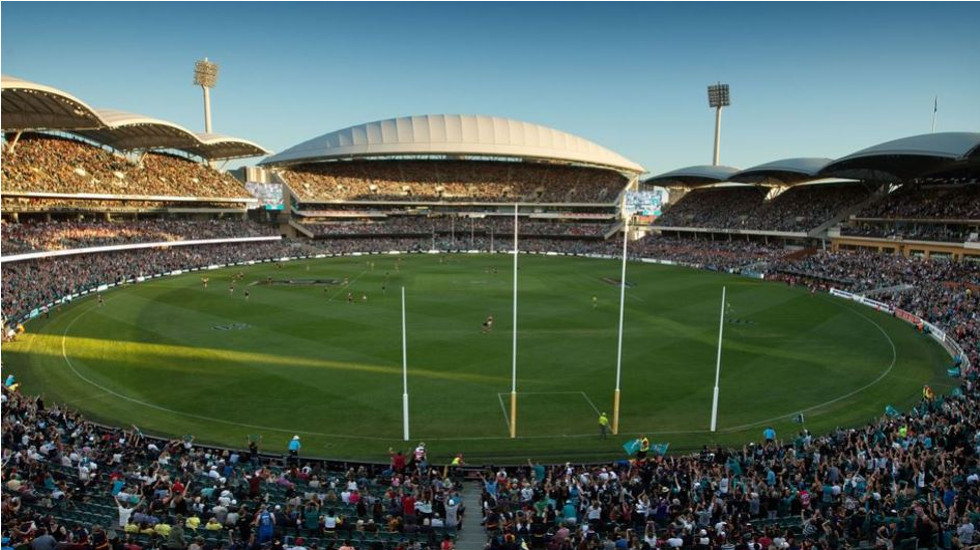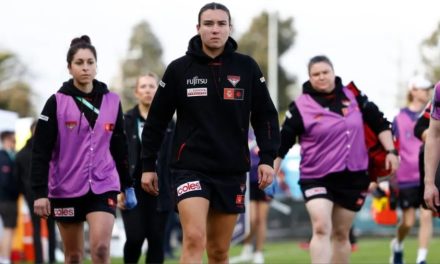The Adelaide Oval upgrade blew out to $610 million, of which the AFL contributed only $5 million. Photo: AFL MEDIA
There’s a neat little trick, folks, being played upon us. Some of the biggest businesses in the land – News Corp, Shell, Pratt Holdings, Chevron and a host of multinationals raking in vast revenues across Australia – pay little or no corporate tax.
For a reason explained below, alongside such entities is the AFL, an organisation which since the year 2000 has generated a six-fold increase in annual income and a seven-fold increase in its operating surpluses before distributions.
In an industry which calls itself professional, which turns over billions per annum, boosted by massive corporate sponsorship, with multi-million dollar contracts offered to administrators, coaches and players, funded by cross medium broadcast deals that have quadrupled in dollar terms since 2005, the AFL is still – remarkably – classed as not-for-profit.
This is because of a tax exemption that dates back to 1936, whereby governing bodies and clubs can be classified as volunteer/community organisations if they provide local facilities and encourage participation in sport.
That’s an escape clause the size of the MCG. Putting it mildly, it’s reasonable to question how the AFL can so eagerly collect tens of millions from junk food and brewing corporations, gambling multinationals and soft drink empires and still embody the spirit of a “volunteer/community organisation”.
Indeed, as if flaunting its tax-exempt and socially irresponsible mindset – as far as this issue is concerned – the AFL in lock down 2020 has served up the golden arches as the major sponsor for its website’s match centre. Keen to check the scores? Sure, you’ll need to navigate past a burger chain before you can.
The AFL is not alone in this regard. The NRL is likewise tax exempt and routinely goes cap in hand to government for stadia upgrades, yet gobbles up untold sums from its “major partners” – gambling, alcohol, junk food.
The kind of products that, well, contribute to physical and mental health issues, addiction and increased morbidity of its members and fans. The kind of outcomes that we, the taxpayers, end up being burdened with via funding healthcare and welfare and paying higher insurance premiums.
Professor Ann O’Connell, a Melbourne-based academic specialising in taxation and a former adviser to the federal government, is adamant that professional sport should not be included in the not-for-profit sector.
“It seems to me the way they operate is that it is all about profit and generating surpluses through gambling and media rights, not just the encouragement of sport,” she told the Sydney Morning Herald in 2018.
It’s a timely reminder when listening to the reasons trotted out for how and why season 2020 is going ahead in such a compromised fashion.
“We continue to keep our game alive … for the players, for the fans, for our clubs,” AFL supremo Gillon McLachlan said this week.
With all due sympathy to the circumstance of damned if he does, damned if he doesn’t, the statement is disingenuous to say the least. The fact is the AFL is in a pressure-cooker of its very own making.
By exploiting the sport’s mass appeal to tap untaxed sponsorship and broadcast rights deals – and let’s face it, this revenue-chasing corporate culture is entrenched across all professional sports – it was inevitable that the league would end up dancing to the piper’s tune. Even in a pandemic.
This is all while it (and the likes of Cricket Australia) expect governments to buddy up for infrastructure upgrades … you know, the very same stadia where sponsors of the league and clubs are rammed down the throats of fans paying for the privilege to attend.
One example to tickle the fancy? The Adelaide Oval upgrade of 2013/14 was costed at $535 million and blew out to $610 million all told. The AFL’s contribution to remaking this magnificent facility? Five million bucks. You know who paid for the rest?
You did.












This is a particularly ill-informed piece
The main reason the AFL and clubs are not-for-profit is because…..they are not-for-profit.
For-profit companies pay company tax on their profits. The AFL’s “profits” necessarily go back into the game.
Like the high wage earners in for profit sectors, the AFL executives and high paid players pay tax at the highest marginal tax rate.
The AFL is also the only sport that regularly contributes to stadia in this country.
Without meaning to be disrespectful, Maximus, that’s a spectacular misreading of the piece’s content and assertions. Indeed, I’m not sure where to begin. So I won’t.
As stated, Adelaide oval upgrade did receive stadium contribution from VFL house. Just under 1 percent. Nice…